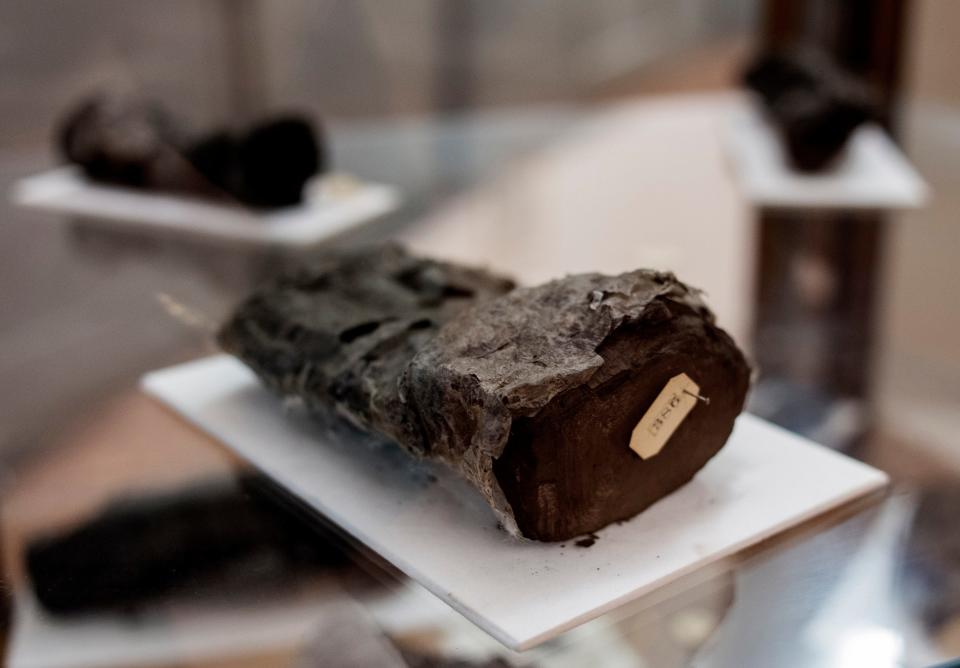3 students won $700,000 for using AI to translate 2 tweets worth of text from previously unreadable ancient scrolls
Three students won the Vesuvius Challenge for uncovering text in the Herculaneum papyri.
The students were awarded a $700,000 prize after using AI to uncover the passages.
The uncovered text talks about "how to enjoy life's pleasures," organizers said.
It pays to be an AI nerd.
Earlier this week, three students took home a $700,000 prize for winning the Vesuvius Challenge, a competition that aims to decode the Herculaneum papyri, a collection of papyrus scrolls that have been unreadable for centuries.
The students, Youssef Nader, Luke Farritor, and Julian Schilliger, had never met in person but were the first team to uncover at least four legible passages in the scrolls of 140 characters each (the length of just two tweets).
“I think this promises a very exciting future where seemingly impossible ideas will become possible,” Nader, a 27-year-old machine-learning Ph.D. student at Freie University in Berlin, told The Wall Street Journal. Farritor, 22, is a student at the University of Nebraska, and Schilliger, 28, is a robotics graduate student at ETH Zurich in Switzerland, the Journal reported.
The scrolls were buried in the first century during the eruption of Mount Vesuvius in the Villa of the Papyri — an Italian countryside estate that historians have linked to Julius Caesar’s father-in-law. About 800 scrolls have been excavated from the site to date.
“Some of these texts could completely rewrite the history of key periods of the ancient world,” Robert Fowler, chair of the Herculaneum Society, which raises awareness of the scrolls, told Bloomberg. “This is the society from which the modern Western world is descended.”

And if uncovering them could mark a pivotal point in human history then their burial was a blessing in disguise. Unlike “virtually every ancient text” that decays once exposed to air, the Herculaneum papyri have been “carbonized by the heat of the volcanic debris” and therefore preserved, according to the Vesuvius Challenge’s website.
Three tech industry veterans — former Github CEO Nat Friedman, founder of the search engine Cue, Daniel Gross, and computer science professor Brent Seales — launched the competition in March 2023. It is backed by a bevy of entrepreneurs, investors, and key figures in the tech industry.
This year's winners built upon work already underway by Seales, who used X-ray tomography and computer vision to “virtually unwrap” the scrolls. From there, machine learning models can be used to identify ink and, ultimately, decipher words.
The passages the winning team uncracked were likely written by the Epicurean philosopher Philodemus and touch on "music, food, and how to enjoy life's pleasures," according to a post by Friedman on X. "In the closing section, he throws shade at unnamed ideological adversaries — perhaps the stoics? — who "have nothing to say about pleasure, either in general or in particular," Friedman explained.
Ten months ago, we launched the Vesuvius Challenge to solve the ancient problem of the Herculaneum Papyri, a library of scrolls that were flash-fried by the eruption of Mount Vesuvius in 79 AD.
Today we are overjoyed to announce that our crazy project has succeeded. After 2000… pic.twitter.com/fihs9ADb48— Nat Friedman (@natfriedman) February 5, 2024
The competition's big winners helped uncover about 5% of one scroll, but the competition doled out more than 50 prizes last year, totaling more than $1 million to teams who helped find the first letters in the scrolls, assisted with ink detection, and developed open source tools.
This year, the bar is even higher, though the payout is lower. The Vesuvius Challenge hopes entrants will help uncover about 90% of the first four scrolls. The winning team will receive about $100,000.
The founders of the Vesuvius Challenge hope they’ll be able to crack open and read the entirety of all 800 scrolls in the next few years.
Read the original article on Business Insider


